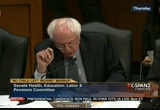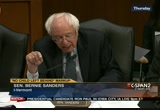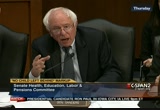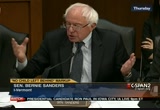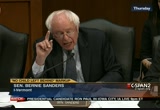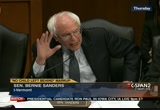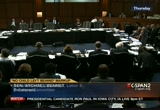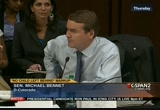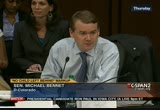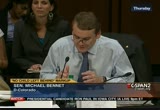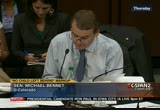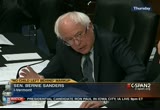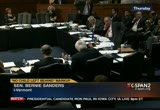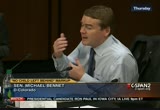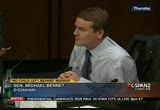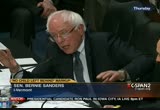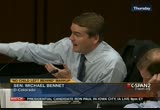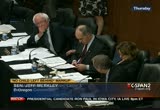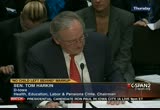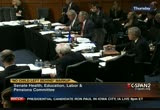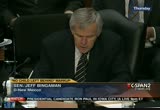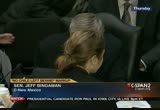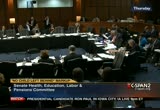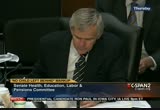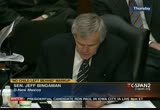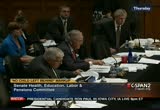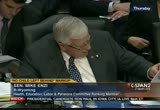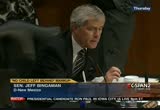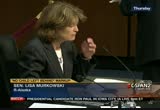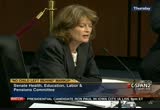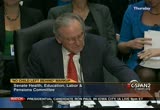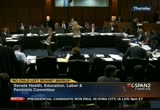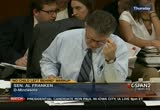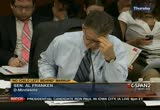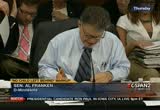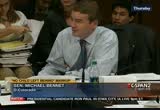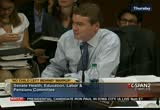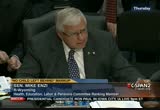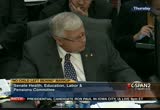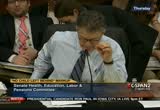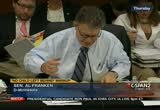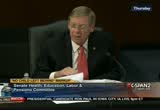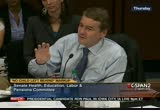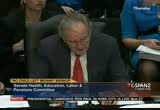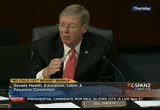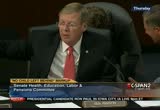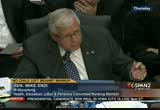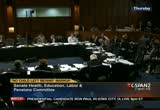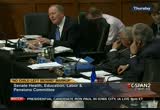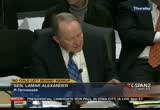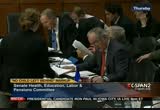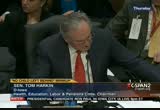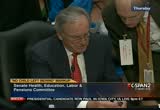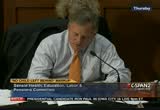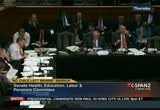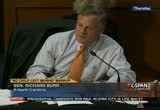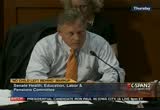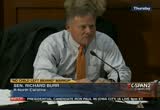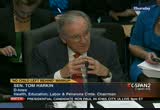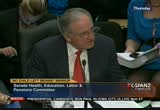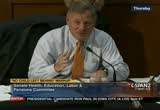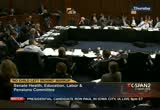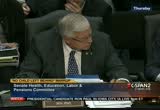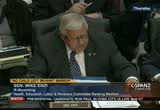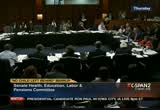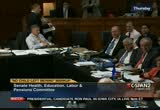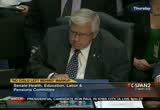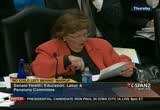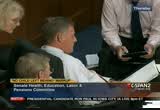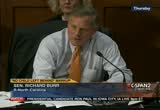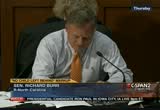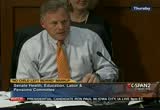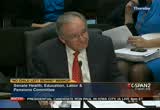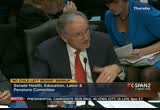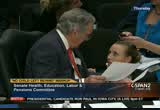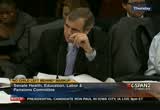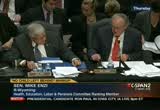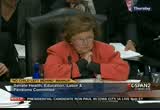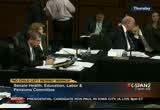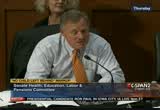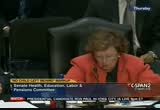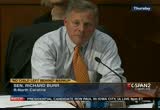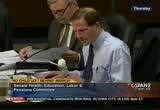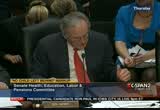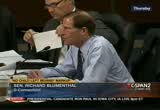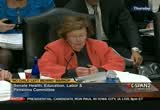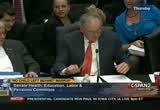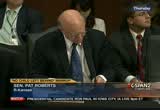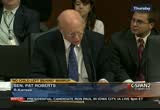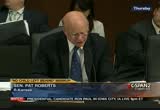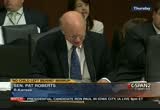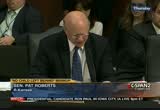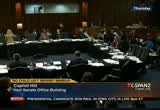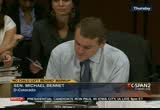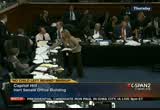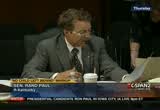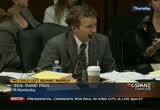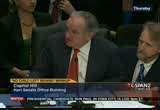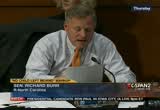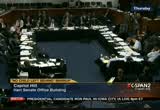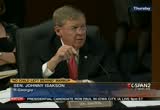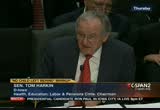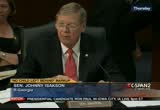tv U.S. Senate CSPAN October 21, 2011 5:00pm-7:00pm EDT
5:00 pm
june, and in september, you're in a classroom where you got a whole lot of problems. .. most of the people around the table will agree that doesn't make any sense. it doesn't make this person not a good teacher, not an inspired teacher. it simply does not make that teacher are highly qualified. now what my two amendments do --
5:01 pm
my two amendments attempt to address this issue. and here's how we do it. the first amendment will require that for a teacher to be quote unquote highly qualified, he or she has to have completed a state approved teacher preparation program and obtain full state certification. that's not a terribly high standard, but that's what we think should be done. let me repeat that. to receive highly qualified status, and that teacher has to have completed a state approved teacher preparation program and obtain full state certification. know what this does not mean is that a person who has been certified cannot teach, doesn't suggest that. it simply means that a teacher is not highly qualified. if he teacher is not highly qualified, what my second
5:02 pm
amendment as a bad teacher can still teach, but must receive mentoring of supervision and support to enable him or her to become a successful teacher that we want to see. there are currently over 400,000 classrooms across the country staffed by teachers who are not highly qualified. many of these teachers are teaching in very challenging schools. a further in those very same schools, the turnover rate for teachers is very high. one of the issues we all know it's in these troubled schools, teachers come in. they are overwhelmed. problems are enormous and they leave after a year or two to find another school where they don't have to face those kinds of challenges. what studies and common sense suggest is those teachers who received the training and or the mentoring not only become better
5:03 pm
teachers, but are more likely to remain in those difficult schools than others without that background. the certainly a goal we want to achieve. we want teachers to stay in the school for a period of time, not stay for a year and leave them that kind of revolving door. while this amendment has very strong support to organizations million of people who have honest differences or opinions about it. one argument that i hear is that the label of highly qualified doesn't matter. what difference? you have young people who are great teachers, people there for 30 years are not great teachers. doesn't matter. while i think it does. a common sense suggests that that argument doesn't have much water. and i would in the simplest of
5:04 pm
any surgery successfully to and while another surgeon may be wonderful, the young surgeon who has been performed the surgery would probably go to to the experience surgery who has already achieved a certain level of accomplishment. what i'm not doing here and i don't want anyone to believe this is disparaging and teachers. why the contrary? we just really excited, motivated young teachers to get into the field. we are trying to bring those people, but were also trying to get them training and support they need to be successful and should be highly qualified and stay in those schools. another argument i've heard against the concept is we will put an end to alternative certification programs. this is simply not true. teachers who complete alternative certification programs or can it. highly qualified if they
5:05 pm
complete those programs. however, teachers who are still in the process of completing a program are not yet determined to be highly qualified. they can still teach, but they have to teach him the supervision and guidance. now why is this issue so very important and why am i offering these amendments? i think one of the other. what we do not want to see as the most troubled schools. we are paying attention to the bottom 5%. those are the schools are focusing on. everybody roundtable wants to make sure that the teachers we attract to the schools the best teachers that we can find. what we do not want, nobody here wants his teachers should be coming into those schools to be overwhelmed, to not have the background, not have the training to be leaving after year. and that is what these amendments seek to address. so when we say that the
5:06 pm
congress, would not highly qualified teachers to be equitably distributed to be focused in low-income schools, schools the people of color as well as middle-class goals, this is the way i believe that we achieve that goal. and i would urge support for this amendment -- these amendments. >> discussion? thanks, senator. >> i respectfully -- >> first of all, thank you, mr. chairman. let me say that i think senator sanders has identified the central issue that we face in the country when it comes to education. and that is how we are going to attract and retain the people we need to the schools and classrooms and how we are going to do it in a way that the kids -- that all kids know they are going to have an excellent teacher and compelling classroom. i think that getting there is going to be beyond what this committee can do.
5:07 pm
our school districts do it. getting there will require some day to abandon a model in the labor market distributed against women and relied on not discrimination to subsidize their public schools is done. thank goodness we don't live in the labor market anymore. but the results of earlier today with the traditional approach to teacher training, to the way we pay teachers, to how we inspire teachers to try to retain teachers is among other things driving 50% of the people out of the profession the first five years. in part for the reasons the senator mentioned commotions they are not well supported when they go into the classroom. they don't have mentors that are by and large successful and there's a lot of other reasons and i won't take the committee's time. a lot of time in this country among the school reform community is spent on the question of finding that
5:08 pm
teachers. people talk about that. i spent almost no time talking about that. i'll stipulate to that. we should do that, but the real crisis we face is not that. the real crisis is in attracting a retaining people to do the hardest work we ask anybody to do. and that's not a politician talking. it's true. there is nothing harder than teaching in high poverty classroom and rural america or urban america. and the idea that we pay people to really pay people, the working conditions are what they are is a disgrace. but i strongly object to this amendment. and the reason for it is that my teachers and now throughout the state i hear this, but certainly when i was in denver i heard this, tell me they are completely unprepared when they finish their degree, to the class room. and the most exciting models that i see across the country are teacher residency models,
5:09 pm
like when we've created in denver, where a young person for a middle-aged person or older person is glass to a mentor teacher, not to prop up a teacher who needs help in the classroom. a mentor teacher who can teach them the craft of teaching and give them real life experience that is also leavened by classroom experience so they can study what they need to know. that's the direction we're heading in. and i don't want to send a signal that says that the wrong direction, d., there is at least as far as i'm concerned to lebanon that the highly qualified designation has been much other than administrative workaround. and i'll finish because they see the senator wants to go. the federal government put in one fell swoop basically
5:10 pm
dismantle alternative certification. whenever possible for schools to hire alternative license teachers they want to hire, which thousands of school districts currently up to do because they see the quality coming. states that might have approved innovative high-quality certification programs like teach for america predicated on the teachers of record while enrolled said they are highly qualified while they are ruled in the program in middle east before they finish. and they are created licenses with the federal government to shift the definition of course they teachers exclude these teachers entirely dismantle records at the state and local level. adoption of this number would kill teach for america, the new project an alternative certification contracts at a program participant is a teacher of record while participating in the alternative surf program.
5:11 pm
in colorado since 1985, over 5000 color at his teachers have been alternatively certified. just if you can teach for america this is a critical path to dealing with the fact that among other things, out of the roughly 4 million teachers we have is the nation, over a million will retire during this decade. speenine further discussion? >> let me just respond. i think it may be senator bennett and i might want to sit down later to discuss this because i think there's a misunderstanding. this certainly does not kill teach for america, nor is it content. i'm a strong supporter of teach for america. your first point about attract teen young people into a classroom and having them
5:12 pm
entered is exactly what were talking about. and if that place, but constitute being a highly qualified teacher. but i don't want to see us in difficult schools inexperienced teachers simply being placed into the school and not have that mentoring were not receive the extra training that he or she might need. so in no way is it the intention or is it the effect of this legislation in teach for america, and i think you're the appointment -- correct me if i'm wrong, you are raising the issue of the significance of the term highly qualified. fair enough. i'm not going to argue with you that there could be someone walking out of college, somebody with 20 years of experience. that's true. but i would say to the chairman,
5:13 pm
if the goal here is can make sure that men are most difficult schools we have the best teachers are we possibly can, there has got to be a criteria. we can't simply say, don't use the word highly qualified if it doesn't mean anything. i think what mike is saying is that doesn't mean anything. and i think that's wrong. there's got to be some criteria or else what will happen i fear, is the lowest income schools, the most difficult schools will end up with the least qualified teachers. >> and that fear is reality. you're right. and you know, it's one of the fundamental changes that we have to make do have our schools succeed, fundamental. and it's going to be really hard to do because there's a lot of folks that want to keep doing it the way they vardy done it. i mean, having seen it and
5:14 pm
having worked on that, i am much less interested in certification -- i'll be totally honest, and certification, integrated, and what the inputs were then im and longevity are not because you're right. it goes both ways. the more experienced teachers that are not very effective coming of inexperienced teachers who are. senior teachers that aren't some that are. i think all the data supports what i just read. what i am interested in is how effective the teachers are. our teachers and schools driven academic growth for kids, measured not in a flawlessly, but a thoughtful way. and that's one of the reasons i'm also going to post the amendment on parental notification. what i want to know as a parent or not the things that are in here. what i want to know about my kids teachers are my kids
5:15 pm
achieving in the classroom? and that is not what is relevant to that. >> if i could. >> i think, senator bennett, i have the same goals. >> we do. and i think we need to talk about it because they think he may be misunderstanding what they mean. but i think -- i've got to tell you, you know, given my view is i don't sit up nights worrying about credentials in augusta. but you're walking down a slippery slope when you really say hey, it doesn't matter what kind of trade. i am all for somebody who's an engineer, getting into a class or income at getting kids excited about that. i must know like stability. you're walking on a slippery slope, which will end up hurting low income kids. those are the schools -- it doesn't matter what your qualifications are. doesn't matter which are treating it. all you need is inspiration. i think you'll agree with me --
5:16 pm
you just said it appeared on the great problems we have is a lot of these new teachers are leaving the schools. childhood rate is tremendously high. and i just think those teachers walking in need some background about the very difficult issue correctly pointed out, challenges they face. they need mentoring. that's who were trying to do here. >> mr. chairman, i know you need to move on. >> one last thought. >> first of all, no matter how all this turns out, would welcome the chance to visit with you and some other programs that i have in mind. not teach for america, the teacher residence programs. i think we do -- i know we do have the same object is here. and i'm not saying training doesn't matter. i'm not saying credentialing doesn't matter. i am seen by and large the training we are providing of the country is almost entirely in effect giving terms of what our teachers need.
5:17 pm
and they do need to be trained. or just not doing it in a way that is material to their support in the classroom. i know it's hard to hear that sometimes, but those are the voices of my teachers. >> senator merkley. >> thank you, mr. chairman. it seems to me like so much of what you're talking about you have in common and it what i've heard throughout the oregon weren't met with superintendent, school board members and their feedback has been we need to make sure we have highly effect of teachers and try to take the message back to d.c., said he miss manners, someone who is highly qualified isn't necessarily the same as highly effect is. and in that context, a lot of support for mentoring programs and strategies that take down
5:18 pm
the silos and support teachers and help make them successful and so worth. so i support you all bring year to persuade this together and helping us figure out how do we get highly effective teachers into the places where we absolutely need them with the most settings. >> mr. chairman. >> i did in the sense -- i. think again most of us are coming from exactly the same direction and there may be some misunderstanding. what i would like to do if it's okay, mr. chairman if it's okay with you, but i would like to do is withdraw the amendment now. i'd like to talk to some of my colleagues in the next couple of hours and then i will reintroduce it. is that something we could do? >> well, the senator can certainly withdraw his amendment. there is no prohibition on that.
5:19 pm
if the senator wants to read -- >> without a major debate. i will accept the time limit the second time around. but i think the upcoming term pretty much the same direction. >> the senator has in front of us to amendment. one amendment has to do with redefining highly qualified teachers. the other it has to do with distribution, rate? >> marl definition -- 100 definition. one is distribution. is the senator want to withdraw with both of those? be my guess, for the moment. >> the senator certainly can withdraw his amendment. >> thank you very much. >> other amendments on the republican side?
5:20 pm
senator murkowski, do you have an amendment? >> not to title one. are we still on title i? >> well, i think we are ready to move off of title i. anyone have any amendment to title i? >> i just had a request from senator mccain that he cannot be here to do his amendment, so he hopes that he can have that opportunity on the floor to do his amendment. i think we set the relevant amendments we want to do on the floor. so i just want to make that announcement. >> absolutely. if there's no more amendments to title i -- [inaudible] any amendments to title ii? senator bingaman. >> mr. chairman, i have an amendment. this is an amendment senator blumenthal and senator murray are cosponsoring. it represents the reauthorization of the existing
5:21 pm
pica education technology program entitled enhancing education through technology. we first included this program in the elementary and secondary education act in 1994. it has been twice approved by that committee with a partisan support in the prior congress we had bipartisan cosponsorship of the reauthorization that i am here trying to propose that we had to the bill. the program has been until recently sunday. congress appropriated almost 700 million in fiscal year 04. he provided 650 million with the recovery act. unfortunately funding for this program is a victim of budget cuts in the fiscal year of oven -- 2011 continuing resolution.
5:22 pm
in my view now is not the time to retreat from supportive education to knowledge he. i have listened to my colleagues here and i agree with much of what has been said. i think senator bennet made the point that i think as he phrased it, we have a completely obsolete system of education. one of the solutions to that problem is to ensure that new technology he are integrated into educational system in an effective way. personalized learning programs, digital text to, blended learning environment, where you incorporate a digital and face-to-face instruction. all of these are type knowledge he based asserts that hold great promise for students and for improving our public education
5:23 pm
system. many experts say most to look at this work include or have concluded that technology is the most cost effective way of implementing and evaluating and scaling of high-quality learning resource is. the efficient use of instructional fun free scarce resources for other uses, such as expanding the school day in providing wraparound services for students or even reducing the deficit. as a sector, education is behind the curve in adapting technology to improve performance and efficiency and cost effectiveness. schools need to be hoped in their effort to catch up with the rest of society in which a student. this amendment will help schools to do that in three ways. first, it would reauthorize the
5:24 pm
current formula credit program come which provides significant flexibility for state and local school districts to design technology programs and appropriate supports that meet state and local needs. second, if appropriations fall below 300 million in any given year and i know in this bill, we are not even specifying authorization models. obviously we can specify appropriation levels in this bill. but if actual appropriations fall below 300 million a given year, the program would distribute funds can cut a deadly in order to encourage states or consortium state to address policy barriers to digital learning. such requirements that textbooks be printed on paper or course credits be calculated using the time and status subject matter competency. finally, the amendment reauthorize existing elementary and secondary education act
5:25 pm
language, which is section 24 lead in the current law that ensures that students are able to access technology in the goal is, but are protected from any inappropriate words seem content. so those provisions are incorporate many amendment i am offering. the bill enjoys broad support in the educational field and in private industry. the national education association supports the bill. the american association of school administrators supports the amendment. and the error, apple computer adobe systems strongly support us. it is the sole existing program dedicated to improving education through technology that we have at the federal level. i believe it needs to be part of the reauthorization bill. i urge my colleagues to support the amendment.
5:26 pm
>> mr. chairman? one of the things that we did was try and combine some programs and put some flexibility in and this had to do a lot with a rural district actually. in wyoming, we wind up with a whole bunch of programs that have to be done with very little money. and they requirements go with it to use up all the money. so really never gets around to what it was intended to do. so we kind of combining the system programs into one program to give enough flexibility that people might be a well-to-do eastern program. i see in this one met the minimum formula amounts to $3000. i am not sure what kind of the science technology engineering and math program that you can have for $3000. and so i prefer to have the larger category more flexible opportunity rather than specifying the 70s dollar pot again. that is why we did the
5:27 pm
combining. >> mr. chairman, i would respond. i agree with the general concept of combining many of the existing programs. in nine of the bill -- the underlying bill that senator harkin in center and they have developed does a lot of that. i do think there are some areas that if we don't specify continuation of a program, it is likely that it will not be continued in funding will not be provided by the federal government for these purposes. i think this is one area desisting schools to obtain improperly use new tech knowledge he. i think that's one area the federal government has made a significant contribution and i'd very much like to see us continue with that. a local way unless we adopt the
5:28 pm
amendment that i'm offering today. [inaudible conversations] >> mr. chairman? >> senator murkowski. >> to keep the conversation going here, by the time it takes us to get this bill to the floor of the technologies that our kids are using have changed and they are moving onto the next thing. as we talk about those dropouts that there's an things that cause our kids to kind of checkout of education, we need to remember that we've got to be delivered education to them in a way that captivates them and challenges them that reminds them of the relevancy and their world nowadays is just so focused on technologies. so i hear the concern that the
5:29 pm
ranking member and i will tell you as one from a very rural state, we've got small school districts that many -- they don't have great writers on staff. i look at this whole inclusion of all of these programs into one big pot of money and know that i'm going to be competing with michael bennett's kid that our in denver school systems, where they have got some pretty top-notch grant writers. i am wondering how many schools are going to be able to stack up and access to the sun. the kind of like the idea that the technology component might be something that is -- it's a separate menu if you will. i think that we need to be current in our schools when it comes to the technologies that we are utilizing right now. and if there's any area that we are behind, i am afraid it's
5:30 pm
that we are not spending enough time making sure that our teachers are current with the technologies. the kids will be ahead of them and then again we don't get the full value out of the technologies before us. so without giving probably as much consideration as we would like to your amendment, senator bingaman, i have to tell you that we need to be focused and we need to be ahead of ourselves when it comes to the technology side. so my inclination at this point is to be supportive. >> if there is no further discussion, the vote occurs on the bingaman amendment. all in favor say aye ko. opposed may. the ayes appear to have it. the amendment is adopted. any other amendments to title
5:31 pm
ii? >> mr. chairman? >> senator franken. on the side over here. >> is anybody over there? [inaudible] >> iges at title i. >> go ahead then, senator. >> thank you, mr. chairman. this is frank entitled to, amendment one. this is the school principal improvement and training amendment. and this is the amendment that senator bennet and i are putting forth. i've said many times in this committee that our job, despite examples of successful models and then find ways to replicate that success. one of the most common features of successful schools in low-income and minority communities is the presence of an effective school principal. research shows that school leadership is second only to
5:32 pm
teacher quality and its impact on student learning. and very often, the school leadership has a huge impact on teacher quality in terms of a track team and retaining and giving professional development to good teachers and of that principle does the opposite. yet, in spite of the importance of school leadership, the federal government has not put adequate quality of decibels in high need schools. this amendment would change that. it would create a competitive grant program that would create a pipeline in effect give principals for high need schools by funding high-quality programs to recruit and train principals to take on the challenge of leading those schools. now, having seen the extraordinary impact of effective school principals in
5:33 pm
minnesota, i believe that improving principal quality is essential to turning around high need schools. we've been talking a lot about high need schools today. one principal who made an incredible impression on me is andrew collins, former principal of dayton's bluff elementary school in st. paul. dayton's bluff is diverse in its poor. nearly all of its students are eligible for free and reduced price lunch. one third of the students are english language learners. used to be one of the worst performing schools in minnesota. only 6% of the third-graders, only 4% of third graders were proficient in reading and math. the new principal collins proficiency in a statement test increased 49 percentage points over three years until it was eight points above the state average. african-american students school performed more than 20-point -- percentage points above
5:34 pm
african-american students statewide on both math and reading tests. now the success of the school is a testament to principal collins and his staff, unfortunately he is the exception to the rule. many districts report shortages of principals who are willing and able to read schools that are particularly need a strong guiding -- a strong guiding hand in the schools are not performing adequately, you know, we hold principals accountable. it doesn't make sense to place underprepared principles and schools to face these great challenges and then be surprised when the schools experience high principal turnover rate and continue to struggle with students. so my amendment -- are meant with support programs to recruit talented candidates and provide them with the intensive training they need to lead high need
5:35 pm
schools, including someone who has been a principal before we get mentored by a principal who has turned around a school. this is -- makes an amazing amount of sense to me. i'd like to thank senator bennet for his collaboration on this important amendment, which should be a vital step i believe towards their goal of closing the achievement gap and i urge my colleagues to support it. >> senator bennet. >> thank you, mr. chairman. senator franken's amendment combines provisions from two pieces of legislation. the school principal recruitment and training act, which was sponsored in the lead at which i introduced. and i won't describe it any more than you did, except to say that there is the data that may show the second most important thing is a great principle, but you
5:36 pm
can't have a great school with a degree principle. and what we have done in this country has failed to train our folks to be, especially in these turnaround situation. and we haven't had available to do it. and senator sanders and i in the last discussion were talking about a high turnover rate of teachers, particularly in high poverty schools. a huge amount that relates to principal leadership. if you've got a great principle than they are making sure that everybody is pulling together in the right direction and moving kids forward, the turnover rates are actually quite low. if you are in a place where you don't see that kind of leadership, the turnover rates are incredibly high. and this gives -- this answers a very important question here and senator alexander has faced this before. you know, it is one thing for us to say you need to turn around
5:37 pm
the bottom 5% of schools in this country. but if we don't have the capacity to actually do that, if people haven't been trained to do it, they haven't seen the models about how to do it. all we will do is create more grief. and this amendment is an attempt to make sure there is -- you know, states and local school districts will have to do a lot of work on their own. but this at least allows them access to some incremental funding at a grant of what i would argue is one of the single highest leverage points for school reform in principle. not the opposite of the principal. if they are in the office, they're in the wrong place. the principal work in the classrooms and school supporting the teachers. so i think senator franken during match for his leadership and i urge all of us to support this effort. >> senator enzi. >> i wish we could establish some kind of a goal early on
5:38 pm
that if you're going to have a program, particularly grant program come you had to eliminate the grant program. >> we do eliminate a program. >> i didn't get to finish my statement. >> are very good on ricardo. i assume we'll do that on this one, too. one of our goals has been to reduce the number of programs we have. all of the things we were doing -- i do remember people complaining when we started this process that still had 868 pages. we have added 200 pages to it today and new programs, new grants, new authorization and it's going to be harder and harder to sell the whole package if we keep adding things to it that are near. so is there a way we can eliminate something to get to do something else? there got to be said that
5:39 pm
affected things were doing and we thought we had eliminated a few of those. but most of those just got combined into a new program rather than actually eliminating them. so that didn't help because they give flexibility to some districts because they now have enough money to do one of the programs allocated out of the dozens that are in now. that helps. but we are growing a direction here, where yes they need to have more and better principles of an hbo to grow the pool. there is title ii money available to do a number of things. in establishing that is a grant program that a lot of the states won't go to put in for, qualify for her won't even be interested in doing because of the paperwork involved in it. is it going to help the cause of the whole bill. >> senator franken. >> let me say what i was going to say is i was so rudely interrupt dean the ranking member.
5:40 pm
my amendment b. lines current law by eliminating the school leadership program or it replaces the school leadership program and replaces it with a more targeted program that senator bennet and i believe it is much wiser use of limited taxpayer dollars because continued funding for grantees would be based on the effect of myth. and so, we have eliminated the school leadership program and replaced with another. so that is what i thought after a so rudely interrupted you, our synergy before you were about to pay me a compliment. i was wrong. [laughter] the compliment was we need to come instead of just adding
5:41 pm
programs, we need to eliminate him, too. so this eliminates the school leadership program and replaces it with something that is more effective. so i would air it should -- that's right. i give myself a compliment. >> senator sanders commentating matt for pointing that out. >> senator isakson. >> mr. chairman, i agree that leadership at the school level, and particularly the principles is probably the most important effort -- element of all. i addressed this question response to what you're saying about the money. on page 16, line eight of his grant funds should be used to supplement any other federal state or local funds, otherwise available to carry out activities described here.
5:42 pm
so you are not taken away. i may be misreading it -- >> welcome the school leadership program was eliminated already in the manager's bill. so this was an anticipation of that. >> what do you anticipate the cost? >> well, it's up to the appropriators really. this will be up to the proofreaders. >> this is some amendment? be my guest, the amendment. so, thank you for helping me provide clarification on that. >> one last, senator bennet. just the ranking member -- the ranking members, it generally. this is not what the ranking member was saying, but it just occurs to me that we do -- we do
5:43 pm
not do a good job in this country of accounting for the education dollars that are spent and aligning the education dollars the stated policies that we had. this does align well because we know we have to turn around 5% of our schools and we know we don't have the capacity and a system to do it. title ii, more broadly, doesn't particularly align well with that activity. i would argue the money is often not terribly well spent. so i think i just want to volunteer that i would be delighted to work with the ranking member anybody else on that because it is the central problem with frankly the legacy of education accidents in past by the congress. >> i didn't want to get involved. i'll just say anybody that says the title ii funds are not used, i would agree with.
5:44 pm
i've often called title ii the holiday in support and sustainability fund. seems like it always used for some weekend gathering some plays they go to these holiday hands and have all these meeting for lunch and go home. believe me, i am not a big fan of how title ii money has been spent in the past. on that point, the language of god on the same page suit team, section jay puts in a requirement that after five years the secretary's report affected just the money and if it hasn't been effective reported to the house committee, i want to be supported by this legislation when we get it to floor. i want to help make it right and i wish we could've done a few things today. if we don't have provisions in their recurrent secretary to report to us now, programs that haven't worked, you could probably fund is -- whatever
5:45 pm
this costs with money money-saving funding for something else hear the secretary could find it doesn't work. >> i would be delighted to work with you on that in the department on that. one of the other components of this legislation, which i also would like to see him much more what we do here is the idea that people -- the grantees also have a show that actually -- there is a result, there is high quality to what they are producing, whether it's teachers or principals. and we've never done that. we've never asked. and we have to make the funding coming in now, a lot of this contingent on people being able to show what they're doing actually works. >> the gentleman from colorado tonight hogged both thought they'd honor deficit reduction and debt reduction and all that. we ought to think about language we can put in this legislation that instead of putting off five
5:46 pm
years in terms of seeing if this one works, let's has to require the secretary to look back and find money now that we ending do we know has worked to fund this new ideas. that's going to make a lot more sense in getting the final bill passed the state senate than if we are just adding without looking for accountability by teacher meetings. >> thank you are a match. >> i would try to work with both of you to make that happen. >> mr. chairman, another point on this. this is at least senator bingaman has a requirement for a small state minimum in his, where they cut some dollars instead of having to compete with the big states of the great writers do not sort of thing. a lot of them don't even apply because they know they are not going to get it and they don't have the expertise or time to do it. so when you are doing grant
5:47 pm
awards selected that way, we are talking about a small number of school districts. >> good point. good point. >> i'm told by staff at at least one of the grants has to go to serving rural schools. you know, i have solved grant writing seminars in rural minnesota for this very purpose. i think it is something and we heard governor murkowski talked about this, that we can't allow, you know, districts that have grant writers and are able to pay for the getting on the grants. >> if there's no more discussion, the vote occurs on the franken amendment to title ii. all in favor say aye ko. opposed, no.
5:48 pm
[inaudible] okay, the ayes appear to have it. anymore -- yes, senator alexander. >> mr. chairman, first, on exile under amendment number four, which has its purpose title i. you earlier, but this big stack of paper on the table that all states have to send in. senator bennet and i have talked about this. and what i would like to do is just call attention to this amendment and then withdraw it and then work with senator bennet, especially. but with the chairmen and ranking member and secretary duncan to see if we can in this
5:49 pm
process, simplify the title i plan of a peer review process that stayed are required to send in. this is nobody's fault really, but just in the nature of things, over time things build up and we can go through there in a sensible way and make it simpler and easier and clearer and more common sense for states to do things on the things they report, people pay more attention to them waste their time. that is something senator bennet and i talked about and i look forward to working with them on that is that correctly state his intention. >> it does. and then, i would like to offer, mr. chairman, amendment number six on public-school choice. this is an existing program that requires local education agencies to provide students the lowest performing -- well, today if you were a failing school, to use the vernacular, school
5:50 pm
districts have to provide parents with the opportunity to put a child in a different school, one they think is better. this amendment -- secretary duncan has said if we don't succeed about were trying to do here, 80% of the schools under the current law will be identified as failing, which means we have an unworkable law at the moment. this would say that the provision about public-school choice would apply to the bottom 5% of schools we've been talking about today. so it is not a new program, but it is a slammed -- it is a program that will affect 5000 schools instead of tens of thousands of schools. it is the only public schools since it is a title i program. and i ask for support. >> as i understand this
5:51 pm
amendment, it would require districts to provide students in the bottom 5% of schools with the option to transfer to a better public school. prioritizes to low-income families in the worst schools and requires students must be treated the same as any other student be allowed to stay in school he transferred to until they graduate. >> correct. >> i think a lot of students who attend the lowest performing schools to transfer to a better public's will is not in the bottom 5% make sense. as long as it doesn't require district to set aside funding for this purpose, this amendment does not include such a requirement. so i understand it that some may not want to waifish ayes turnaround and so providing them with this option to go to another school i think is a positive step. again, i would say probably in many rural districts, this doesn't really work that well,
5:52 pm
but in many urban districts, i think it would be meaningful and it would support the amendment. any other further discussion? >> a question occurs on the amendment offered by senator alexander. all in favor say aye. opposed, no. the ayes appear to have it. the amendment of the doubt. -- the amendment is adopted. we have had to on this site and so i would recognize senator byrd for an amendment. >> borough amendment number one under title ii. >> number one on title ii. >> number one under title ii appeared wearing title ii ii, correct? >> yes, sir. >> what i will try to do is be extremely brief and answer what was just debated whether debating senator franken's
5:53 pm
amendment. and that was fixed that too many programs and we need to purge the system of programs. i was just my colleagues very few of the programs that are available in secondary education legislation. do we know whether they work or not? they certainly have fans. but we don't know because we don't ask for the data to prove the success. but we don't know because we don't ask for the data to prove the success. but we don't know because we don't ask for the data to prove the success. as it streamlines about 50 authorized and appropriated programs under the elementary and secondary education act into two flexible, foundational block grants rather than washington and the federal government determining funding priorities for states and local school districts. this amendment put locals in charge by allowing them flexibility to fund locally
5:54 pm
determined programs and initiatives that meet the varied and unique needs of the individual states and school districts. states and local school districts, not washington d.c. are the best makers of education decisions. unfortunately, in the last few decades, the federal government believing it knew best has exploded has exploded in the number of small categorically educations in k-12. all most every year, yet another program has been created in pursuit of the newest educational raise. with each of these new programs, state and local school districts have lost all foot ability in federal funding sources to allow them and not the latest fad to determine how best to allocate precious federal resource is to meet the unique and specific needs of the individual students and their state and districts.
5:55 pm
so in essence, what do we do? we create two flexible spending cuts. let me say up front, this is title ii. it is not title i. we do not touch title i money. but we take all the rest of the title ii programs and dump them into two block grants. one is the safe and healthy students block grant. the other is defined for improvement of teaching and learning. we give full flexibility from one pot to the other. we also get full flexibility from both pots to title i. if in colorado that determination is made that title i need for money and funding title i is more important to the success of the bottom 5%, then they could pull money from the fund for improvement of teaching and learning. they could pull money from the safe and healthy is didn't block program to increase the dollars
5:56 pm
in the title i. if in fact the improvements in teaching and learning are not that districts problem and they need mermen in the the safe help the student locker area, it's that ability to follow money over to it. basically what we are doing is not prescribing too bad the only weak at the federal money is if you do this federal program. now, i recognize that there may be some afterschool programs currently funded that are now thrown into a pot and they compete with every other names so that school districts might have. this is not inconsistent with what i said were the last day and a half. i believe those local school systems know best what their needs are to overcome the educational challenges. now, it is predetermined that we are going to have federal accountability.
5:57 pm
that is what this bill is about. but here's a real opportunity underneath that to say we are going to give local school systems the flexibility of determining what programs best fit the needs of those students in those schools. so i'd encourage my colleagues to support this amendment and i would yield the floor. >> let me make sure i've got this straight, senator burr, that this amendment would consolidate programs of both title ii and title iv? in the that's correct. >> and put it into two block grants? been that that's correct. >> take the safe and healthy students promised neighborhoods current information resource centers in consolidate and put
5:58 pm
those all into one block grant? >> that's correct. >> and then it would we eliminate the pathways to call it spam? >> it doesn't eliminate options. >> i mean, it puts them -- it doesn't leave them as -- well, it would eliminate, but it puts them onto a block grant. >> that's exactly right. it gives flexibility to the school system to determine how best to meet the educational needs of that particular average school. >> well, again, i realize this is a big leap, mr. chairman. we are giving up control and actually turning it over to local school systems. we are a financial partner, but not the architect of their
5:59 pm
6:00 pm
>> we talk with parents, teachers, administrator, and out of that, we get ideas and on what directions to take in funding for education. we don't all agree on the same thing, but out of the sort of melting pot, we kind of get ideas of where we want our federal dollars to go and for what things, and it changes over time because things now are more important than they were in the past. we went from 82 programs to 40. i think i just added one if i'm not mistaken. >> more than one. >> no, maybe one or two today. again, it's just a lot of priorities that senators have and congressman have and that we
6:01 pm
work on, and i just -- i just think that we -- this is my own feeling, my friend, is that i don't fulfill my responsibility to my constituents if i don't represent what they want in terms of guiding and directing some of this money. you know, within the context of votes, obviously, i might one things that my constituents want, but i don't get because i don't have the votes for it, but nonetheless out of this, we all have programs 245 we'd like -- that we'd like and want to support that we feel meet national goals and requirements, and so that's why i -- >> mr. chairman? >> sure. >> i'm a good vote counter, so i know the outcome of the vote. i can cut the debate short because we've had some today
6:02 pm
that are too lengthy. >> okay. but there's no alternative motive. you know exactly what it is. if you believe that those local school districts care about the success of the kids and will use that money pulls their kids up, if they want it all in a neighborhood program that's available, then that's fine, but i hate to see north carolina held to you implement this or you don't get the money when they can take the money, put it in an improved program that actually benefits kids in that education system, so with the exception of the hurt feelings of the authorship of these programs, i'm suggesting let's do exactly what many said. let's remember, this is about the kids. it's not about us. it's not about programs we
6:03 pm
author. it's about how it affects the education of those children, and if you do, then i think this amendment should be passed, and i would ask to call for the vote. >> mr. chairman, before you call for the vote, i want to ask for you to take a look at that. you know, we come up with all kinds of idea with great projects that should be done, and we allocate money in very specific packets to it, and, yes, it'll make us feel good, but it's not always what needs to be done in that local. one of the things i recognized as mayor is that all the people live at the local levelment they don't live at the national level, but the national level's always handing down great ideas that they ought to try and do, and it's okay to hand down the
6:04 pm
ideas, but i don't think that it's okay to make them do all of the ideas. sometimes if they consolidate and do a few of them, they can do them really well, but if they have to do all of them, then they probably do quite a few of them poorly, and some of them are done poorly because they don't want to do them at all, but they baht the money, so they might as well use it, and that's not a good use of it either. i think it would be helpful to do this kind of a consolidation, flexibility, and use of the money, and i think we gopt better -- get better use from the money outside the specific things we put in there which i've talked to some senators or past senators with programs named after them who are very protective of the particular thing that is named after them until i point out what it's evolved to, and they tell me that that's never what they anticipated it to be, but the money still has to be spent for
6:05 pm
what it's evolved to, not what they thought it would be, and this gives a way for the districts to really figure out what will make a difference and to make the difference. >> no further discussion, the vote occurs on the burr amendment. all in favor say aye, oppose no. the no's appear to have it. the no's have it. the amendment's not adopted. now, if senator sanders is ready -- >> just one minute -- >> certainly. >> this amendment is an important amendment supported by every civil rights organization in the country by organizations representing people with disabilities. the reason is that these organizations are appropriately fearful of the fact that unless
6:06 pm
there's certain standards, low income school, the most troubled schools in this country will have a lot of unqualified teachers there, turnover rate will be very high, students will not get the education that everybody in this -- on this committee wants to see them get, and that's about what it is about. i would appreciate support. >> i would like to ask the senator which amendment are we -- >> this is title i, amendment sanders 2 and title ix amendment sanders 1. we're offering -- >> wait. >> title 1 sanders two first on teacher support, two separate amendments. >> we had a great deal of discussion on this earlier. i don't know if we need more discussion. all in favor -- >> ask for a roll call vote on this if i could, please.
6:07 pm
>> was there a modification, mr. chairman? >> i'm sorry? >> was there a modification? can i ask a question of the author? >> yes, sir. >> under your legislation would the graduates from teach for america qualify as highly gifted? >> if they had mentoring and passing a test, yes, they would. >> but not all teachers -- >> if they simply went into a school, no, they wouldn't. they would not qualify as highly qualified. >> okay. thank you. >> question a roll call vote on sanders amendment number two to title one and two. >> yes. >> [inaudible] >> senator bingamon >>?
6:08 pm
no. >> senator sanders. >> [inaudible] >> senator casey? >> [inaudible] >> [inaudible] >> senator berkley? >> aye. >> senator franken? >> no. >> senator bennett? >> no. >> senator white whitehouse? >> no by proxy. >> [inaudible] >> [inaudible] >> senator enzi? >> no. >> senator alexander? >> no. >> senator burke? >> no. >> senator aye sackson? >> no. >> senator hatch? >> [inaudible] >> senator mccain? >> no, by proxy. >> senator roberts?
6:09 pm
>> no, by proxy. >> [inaudible] >> no. >> senator -- [inaudible] >> no. >> senator harkin? >> no. >> three ayes 18 nay, the amendment is not agreed to. now we're vote on sander's amendment 1, title 9. did you wish to -- >> [inaudible] >> feel it's been explained enough? >> yeah, i do. >> okay. roll call vote on sanders amendment one to title nine. >> >> i need to pass because i've just come in. i want to make sure i know what i'm doing here.
6:10 pm
>> okay. >> senator -- >> no, by proxy. >> no by proxy. >> [inaudible] >> no, by proxy. >> senator sanders? >> [inaudible] >> senator casey? >> no. >> senator -- [inaudible] >> no. >> senator merkley? >> no. >> senator franken? >> no. >> senator bennet? >> no. >> senator whitehouse? >> no, by proxy. >> senator blumenthal? >> no. >> senator enzi? >> no. >> senator alexander? >> no. >> senator hatch? >> pass. >> senator mccain? >> no, by proxy someone >> senator roberts?
6:11 pm
>> no. >> senator kurt? >> [inaudible] >> [inaudible] >> mr. chairman, i wish to be recorded as voting no. [inaudible conversations] >> senator burke? >> senator, i call up amendment two under title two. >> amendment number two. >> again, mr. chairman, i will try to be brief on this. today, we've heard a lot about equity, and the need for equity under the sea. at the same time, a lot of people around the table purport
6:12 pm
to support equity, and this reauthorization of elementary and secondary education, they've signed on to a bill that is often anything but equitable in the distribution of federal funds. one of these inequities is most evident in this bill's title two formula which continues to hold harmless provision funds on the basis of population numbers that are over a decade old. in the allocation of funds under title two, each state first receives an amount to the fy2001 grant under two programs. the eisenhower professional development program and the class size reduction program. only after each state is awarded what it received in fy2001, did the remaining funds go out based upon current population numbers.
6:13 pm
these programs in their allocation formulas continue to substantially influence the distribution of title two a funds as the 2001 year appropriations for state grants under these programs consists of approximately 85% of the 2001 appropriations for state grants under title 2a. now, rather than fix this inequity, this reauthorization comepounds the -- compounds the misallocation of the title two funds continuing to send the majority of the funds out based upon where kids lived more than a decade ago rather than where they live today. continuing to send 85% of the title two dollars out based on the old population numbers that are more than a decade old is
6:14 pm
not only not fair to north carolina, but it's not fair to any state that has had growth in their population. north carolina has seen over the last year, 18% growth. arizona, 26.4%. colorado, 16.9%. georgia, 18.3%. nevada, 35.1 percent. utah, 31.8%. >> washington, 15.2%. these are all states represented in this committee that are getting cheated because we don't want title two money to actually follows students. i would suggest this is long overdue amendment to change the formula so simply the dollars follow the kids. i urge my colleagues to support it.
6:15 pm
>> formula changes are always tough. this is a formula change that affects every state in the country, and these -- i would just hope that this would be the kind of thing that needs to be debated on the floor, and so that we can have all the states represented. some states lose a great deal, others gain a great deal. i'm not saying we shouldn't revisit the formula itself, but i think to strike it right now would not be the appropriate thing to do, and i hope that we would address this on the floor so that all states would have a chance to be represented.
6:16 pm
>> i guess my question was why wasn't it updated from a formula standpoint based on the fact that i would presume it was in place ten years ago to follow the students, why not during this long period of time, why didn't we update it? senator, i don't know if you have the answer. senator harkin? >> i would be the wrong one to tell you why the update is not in the reauthorization of the elementary and secondary education. >> i would assume that we must update it every ten years when we have a new census. >> the last time was in 2001. we have not had this reauthorization in 2001. why is it not in the base bill? >> yeah, sorry, that's the question. since it was done in 2001, and we have the new census and all -- >> i believe someone's going to try to change it on the floor, and 245*s the proper place -- that's the proper place to do it
6:17 pm
is on the floor and not on the -- >> the reason i offer the amendment in committee because i believe it's the committee's responsibility to present a product to the floor that reflects what the committee understands equity to be. i don't believe that it's the committee's role to send a bill that is not equitable to the floor and try to change it here, and, again, when 85 -- when the formula that's going into the reauthorization has 85% of the funds being distributed based upon 2001 numbers, something's really wrong.
6:18 pm
[inaudible conversations] >> while we wait for the chair, i thank you for your amendment and also say on the last amendment where you may have gone further than i would like to go directionally, i'm interested to talk more about the kind of consolidation that you're talking about. >> i -- i'm sorry. >> no, no. >> i missed that. >> you know, again, formula fights are always bad. yes, you might say, well, it should be based on population. well, maybe yes, and maybe no. population is one determinant, but i say to maybe people living in wyoming where we don't have a lot of population, but a lot of distances or alaska or even in my state of iowa where we've lost population. we have not gained population. we've actually stayed steady,
6:19 pm
lost in proportion to the rest of the country, but that doesn't mean that the need isn't still there for the kind of money they have been getting in the past. it depends upon those individual circumstances in those states, so i don't know that just basing it on population alone, i mean, a state may have increased population, but it may be a fairly wealthy state. maybe they do really well. maybe a state like iowa where we have not increased in population, maybe we're not so well, so there's other factors. yrch it's both on population and -- >> it is written it addresses population and poverty. i might address we have held harmless the small state precision, so we've tried to take into account the
6:20 pm
difficulties that this might present to a small state. we've tried to write a formula that is not only focused on population, but on poverty which is at the root of title one, and i think as long as you have incorporated those two things to distribute the money based upon where the students at risk are is, in fact, the appropriate thing. it's not a risky thing. >> there's a whole harness of one-half of 1% of the total, but i don't know. is that sufficient or not? i don't know. i don't know if that's sufficient or not. >> thank you, mr. chairman. isn't the one-of 1% a minimum amount for states? take a state with a very small
6:21 pm
population. they would receive many, many times the number of dollars per school that say more populous states would. talking about fairness. if you happen to be a small school district in a small state, you get more help even if you have the same conditions. as long as we're talking fairness here, how do you make that fair? just out of curiosity. >> is this gentleman suggesting perfecting an amendment of mine? >> no, no, not at all. >> i would entertain you second degree in this to knock it out, and, yes, we would then go to population in poverty, but i think there are merits to recognizing the fact that that small states might not have the resources and federal obligation
6:22 pm
and commitment helps them to overcome that, but it's -- it's begin -- given that we're at a point of reauthorization, we don't do this frequently. this is a real opportunity to get this right, and i think i'm as close as to what i think tries to accommodate everybody's needs other than -- i don't want to lose something even though i don't have the kids to sub stanuate how much money i'm getting. >> can i pass to my good colleague? is there a chart available on how this affects all the states? >> i can certainly make it available to you. >> that'd be terrific. thank you. >> mr. chairman, let's vote. >> no further discussion -- >> mr. chairman? mr. chairman? i don't see many decreases in many, and i think it's appropriate for us, since this is a new -- there's a new census out, that we follow the new census, put it in the base bill
6:23 pm
it can still be amended in different ways, and that's what happens with the formula, and there's areas where they can raise their areas a little bit, and we'll put in amendments, but i think this is a much more difficult thing to get fairness on the floor an some of the other things, so i would hope we adopt this. >> all in favor, aye. all oppose, no. well, the ayes appear to have it. ayes have it. >> mr. chairman, can i take 0 seconds to inform the chair and ranking member? the same inequity exists on title one. >> i'm sorry, i'm going to call for a roll call vote on that, i guess. >> sure. >> amendment number two. >> call the roll, please. >> senator bingaman?
6:24 pm
>> no, by proxy. >> senator murray? >> no, by proxy. >> senator sanders? >> no, by proxy. >> senator casey? >> no. >> senator hagueen? >> aye. >> senator merkley? >> aye. >> senator franken? >> aye. >> senator bennett? >> i. >> senator whitehouse? >> aye. >> [inaudible] >> [inaudible] >> senator enzi,? >> a. >> senator burr? >> aye. >> senator isakson? >> aye. >> senator hatch? >> aye, by proxy. >> senator mccain? >> aye, by proxy. >> senator roberts? >> no. >> senator mirkouski? >> i. >> senator harkin? >> no.
6:25 pm
>> the amendment is good adopted. >> mr. chairman? [inaudible conversations] [laughter] >> if i could be recognized for one minute? >> i wish my little state to be held harmless. >> senator? >> inform the chair and ranking members, we worked on a formula change to title one. we hoped to have it done for the mark up. we are not there, but i want all members to know the same disperties exist in title one formula as they do in title two. case in point, the dollars in
6:26 pm
title one range from a low of $1238 per poor child to a high of $3576 per poor child, and when you add in the additional stimulus money that was targeted towards title one in 2009, the range grew from a low of 21 # 25 per poor child to 644 per poor child in another state. though not at the bottom of the list, north carolina is in the bottom ten states in the a. of title -- amount of title one funding it receives per poor children. five of the states remitted on this committee, utah, iowa, north carolina, tennessee, and arizona make up the bottom ten. i hope to work with senator
6:27 pm
bingaman before this bill receives floor, but i hope to -- >> thank you. >> mr. chairman? >> i -- >> mr. chairman? >> can i make a statement? >> yeah, sure. >> my staff and senator enzi's staff have been serving your staffs, and we have approximately 30 amendments remaining down from the 134 #. i believe it's possible to complete work on this bill tonight either before we begin stack votes on the floor or if we return to the committee room once those votes are complete, that would mean we do not have to reconvene tomorrow. senators would be free to return to their states or other travel. i ask senators to work with us, remain flexible as we consideration legislation this evening. >> senator? >> i would like to come up to my
6:28 pm
difference from north carolina. i understand the thrust of his amendment to adjust for population changes. as he works with senator bingaman, we want to -- there's certain issues around being held harmless. if we could be included in the discussion, because it's not only -- i'd like to consult with my state, work with you. we understand there's been demographic shifts, and we need to acknowledge that, but then we have some other dynamics, so we'd like to be included and see how we could be constructive in this discussion. >> i certainly entertain your discussion on anything. mr. chairman, i wonder if it's right to make a unanimous concept question? >> i make a request we limit
6:29 pm
debate on additional amendments to five minutes in total and we vote, and i think we could expedite the process of moving through 30 if all the members would accommodate that unanimous consent request. senator's made a consent request that all -- >> reserving the right to october. i'm over here. [laughter] how about a six minute statement, i'll withdraw the amendment so in the interest of time, you're happy to hear that, but it is six minutes, so if you give me six and then hold everybody else to five, that'd be great. [laughter] >> let's do the unanimous concept request, and i'll make sure the chairman's clock does not start until one min's gone by, how about that? >> i can ask unanimous consent for a minute if i'm not done, and then perhaps that would work out. [laughter] >> i don't know. obviously, i won't object.
6:30 pm
i'll rip and read it in five. >> i'll ask both staffs to keep the time, and i'll keep it done to five minutes, but sometimes it could be six or seven minutes. i'll try my best. >> i tried my best. >> i'll try my best to keep it.name. >> somebody have a bell to ring at five minutes to give a signal? [laughter] >> senator blumenthal, you're next. >> thank you. i assume the senator from north carolina would make that suggestion knowing i'm offering the next amendment. i'm offering blumenthal-casey amendment title two one supported by my colleagues, and i ask unanimous consent that senator kirk be added as a cosponsor. ii believe he wishes to be added. this amendment really is very,
6:31 pm
very important in directing the department of education's institute for education sciences to continue research and development activities directed and related to gifted and talented students, particularly those who have been under represented as gifted and talented. the chairman and ranking member well know as we all do that the bill before us has a great many references to english language learners and individuals with disabilities, and those populations deserve and need the kind of attention they receive in this bill, but there's also another group, the gifted and talented, that are highly likely to drop out or receive less than the attention they need and deserve, and this population has
6:32 pm
unique needs like individuals with disabilities and unique language learners, and the bill before us, i would suggest it should be amended so that grants and research activities through the ies benefit these gifted and talented students by providing the tools and training that our teachers need and by providing all kinds of technology driven advances to the benefit of those students. this amendment provides this direction which in the past two appropriation bills have been b included, and very simply, they should just continue. >> i say to my friend that -- that this, the gifted and talented program is listed in the programs of national cig cansz in title four part h of
6:33 pm
the bill. it's an allowable activity. it's one we agreed would be in the base bill, but not separated out, but would be an allowed use of the funds in that program. >> it would be allowed in the program, but it observes additional encourage. the federal grant program in the programs of national significance is to the department of education. this one is two the ies, and therefore, it is a different methodology of selection, but apart from that point, it really deserves the kind of attention, gifted and talented students deserve that attention through that program, mr. chairman.
6:34 pm
>> it's an important program. yes, senator? >> i want to support the blumenthal amendment, and i had in my own state johns hopkins run the center of talented use. when i asked what are the federal programs helping gifted and talented kids, they said it's up to the pop pielation. there's a program, it's modest, and there's a stereotype that's a bias against the gifted and talented. there's a bias that believes that smart kids are rich kids, that smart kids don't come from neighborhoods like mine where they filmed the film "the wire," and somehow or another we got away from believing that intelligence and talent is randomly distributed through our population and teachers are better serving children who are under achieving than children
6:35 pm
with enormous poral. what we're asking for, i think, and we have senator grassley interested in this, the chairman's been very good at including the talent agent, but we need to know more about the kids, and our teachers needs to know more how to help the kids along. many of the kids who drop out are not because they are intellectually limited, but because they're smart and they are well beyond their school and often well beyond their teachers who know how to help really smart kids. i support the initiative. >> all in favor of the blumenthal amendment say aye. oppose, no. all, all of the ayes appear to
6:36 pm
have it. ayes have it. okay. now we go to senator roberts. >> thank you, mr. chairman. thank you all for your indulgence. i have letters of the support from the nea and american association of school distributes. >> which amendment is it, senator rock -- roberts? >> sorry. b1. title five one. >> okay. i thought we were doing title two. >> b stands for five if you're greek, if you're roman, i don't know what the hell it is. i want to ask unanimous consent to senators paul and hatch as
6:37 pm
co-sponsors. is that without objection? >> without objection, of course. >> okay. thank you. unfortunately, i was telling my colleagues i'm concerned about the administration's effort to implement the race to the top, rtt is the acronym, put forth quickly without sufficient review. rtt created in the 2009 stimulus package as a competitive grant program that provides federal money to states that enact plans to improve student performance by making progress on standards and assessments turning around low performing schools, boosting teacher quality, and adopting common standards for curriculum, however, we have yet to see whether rtt actually promoted increased student achievement. it seems premature to fully implement a still expermittal policy -- experimental priority when grantees receiving awards have been granted more than two dozen, two dozen, time line
6:38 pm
extensions. according to a june 2011gao report in 20 states, they interviewed requiring a significant amount of time and effort. in fact, one state official estimated that her state spent at least 4 # ,000 hours in preparation for their rttp application. in addition, nine out of 12 states reported a variety of challenges including a variety of staff, complex requirement, and lengthy documentation reviews. as a result of the challenges, states have been slow to draw down their rtt grant find. as of june three of this year, states had drown down about 96 million or only 12% of funds of the year, year one total, that's the year one total of rtt grant
6:39 pm
funds totaling -- while educators understand the role of competition and education, quantify cation of rtt puts small and rural school districts at a distinct disadvantage. it is not a willingness to compete, but the capacity to compete makes this a priority of competition so unpalatable. the federal government should not -- pardon me, should focus, should focus resources and involvements on the initial commitments including title one and really getting them right. i know the chairman worked hard on both items. whenever i meet with my k-12 education group from kansas, the one major message i receive is unified opposition to rtt because it places small rural states at an unfair disadvantage. in addition, i do not believe that the federal government
6:40 pm
should be mandating a one-size fits all education reform agenda by preparing a financial reward system in order to force states to make changes deemed worthwhile by the administration. my good friend, a person who the chairman knows and who the ranking member enzi knows and senator alexander knows, he is the former superintendent of the month come ri county schools. recently said in a "new york times" article, a major failing of rtt's evaluation system is it's imposed from above rather than being developed by the teachers and administrators who will use it. people don't tear down what they help build. the original intent of esea and title one was to help level the playing field for disadvantaged student, especially those in poverty. when federal education dollars are extremely limited, state budgets are in dire straights. why take viable resources and
6:41 pm
funding away from states that choose not to apply for rtt or do not follow reform directives from washington? now, mr. chairman, i understand how this is going to come out. i think this will be a party line vote or perhaps not. there may be at least some negative votes that agree with my position, so i would like to withdraw the amendment and i hope if we -- if and when we get to the floor, that i would like to offer it at that time, so i ask unanimous concept that i may withdraw the amendment. >> senator within his right to withdraw the amendment, and -- >> i appreciate that, and with that withdraw, we will not extoday 900 pages in the bill. [laughter] >> i say to my friend from kansas that i sympathize with him. we changed -- we put in the base
6:42 pm
bill a priority for high need, low income poverty areas in rural areas, so that is in the bill for this race to the top, so hopefully we've changed that a little bit. we're going to senator bennett. >> thank you, mr. chairman. i wanted to be recognized to call up title two, amendment one, the great teachers and prince pams amendment i worked on with senator al exander. as we -- alexander. as we mentioned earlier, and i won't repeat the ground we already trod, but to say teachers all over the state, all over the district tell me they were not adequately prepared to do the hard work we ask them to do, and that's why we created the denver teacher residency program, one of a nemple programs in the -- number of programs in the country, and it was a very, very difficult process. a few things in expolicy is as
6:43 pm
as challenging. the great teachers and principals supports the training programs to prepare teachers and leaders to serve students 234 a high need area. this is a voluntary program. states can choose to participate -- we're not, and so can any prep cation program including higher education and certifications of the like, they are designated teacher principle training academies. the great act improves teacher and principal training in three key ways. improving the activity by raising requirements, requiring hands on trains to prepare them like we do with doctors, candidates only graduate once they prove they can improve student academic achievement. participating states will agree to remove burdensome regulations on these programs. this supports the efforts the
6:44 pm
department announced for reduced regulations and focus on outputs rather than inputs. they emphasize quality. states are required to shut dawn academies that fail to produce great teachers or leaders. more than 80 organizations signed on including the center for american progress, university michigan school of education kept lines for educational options in the business round table, and i encurnlings the colleagues to support the amendment. >> i agree. >> well, again, it's a voluntary program. it would emphasize the results of the program. i commend bennet and alexander for their work. all in favor, aye. all opposed, no. the ayes appear to have it the the amendment is adopted. senator paul? >> this amendment is title nine, amendment 21, and i ask unanimous concept to change the wording slightly, and i believe
6:45 pm
this is passed around. it's changing the to exempt special education teachers qualified in special ed and are otherwise exempted from the definition of highly qualm mid teacher. this is what we talked about earlier that the definition of highly qualified teacher is difficult to assess in a special ed teacher, and i think they are punished for progress on kids taking standardized tests with special needs, and i think it's difficult to assess teachers in that fashion. everybody have a copy? still witting? >> all i have here is -- [inaudible conversations] [inaudible conversations]
6:46 pm
>> this is not worth passing out because that's doesn't have the new language on it. do we have one with the new language? [inaudible conversations] [inaudible conversations] that's not the new language. that one just passed out was not the correct one. someone have the correct one? >> go ahead and explain. >> essentially this is a very simple amendment. we talked about the highly qualified teachers. i think the special ed teachers get a raw deal and are not assessed in an accurate fashion so i think it's difficult to assess a special ed teacher begin the difficulty of
6:47 pm
assessing the testing of special ed children, so this exempts the special ed chirp from the high qualified teacher definition, and it says, and it's basically one instance, special education teachers qualified in special education are otherwise exempted from the definition of highly qualified teacher. >> that would be in the core subjects that they teach? that'd be exempted? >> correct. >> yeah. [inaudible conversations] >> just as a clarification, if they are qualified in the area to be a special education teach
6:48 pm
e then they are considered qualified to teach the kids whatever subjects they need to teach them? >> correct. >> thank you. >> senator paul, as i understand it, under id -- [inaudible] told that special education teachers required to do two things. they have to be trained in special education practice, and then they have to have -- have to be knowledgeable in the content area. that's the highly qualified field? >> right. >> are you saying all you want is to have them be qualified in the practice of special education? wouldn't you want them also to be able to know the content areas that they are teaching? >> i guess my understanding 1 they are judged under the highly qualified teacher definition and judged on scores their kids make
6:49 pm
on standardized assessments, and this exempts them from being judged in that fashion. >> mr. chairman, my understanding is that senator -- for highly qualify individual would have to be qualified in a certain subject matter, and i think he's doing is saying that you've got quality teachers who have passed the certification to be special needs, but there's no -- we're really going overboard to say then you for every subject matter you might be responsible to teach that student, to be highly qualified, you have to get certified for every subject matter. it's different than what you said what the goal is which is well rounded of the subjects they are incurred with, but
6:50 pm
don't require them to get the certification requirement for that particular subject. is that accurate? >> yeah. >> yeah. [inaudible conversations] >> senator merkley? >> thank you, mr. chairman. ?afort paul, just a -- senator paul, just a clarification, is this what we work off of? do we have an amendment? >> yeah, we have an amendment written. weave been, you know, trying to work our way through the bill. >> okay. i see from your team, copies are coming. okay. [inaudible conversations] >> i was told by my professional staff that on the content area, they only have to be knowledgeable, highly qualified in one area. one area, not all the subjects they teach, but in one major area they have to be qualified. >> did you have an observation senator isakson? >> i didn't want to interrupt.
6:51 pm
let me just read here for highly qualified teacher certification, a special education teacher would have to meet these four things, have a bachelor's degree, hold a teaching license and/or certification in the state, be certified as a special education teacher, and demonstrate competency in each of three reading, math, and science subjects either by passing a rigorous state academic subject test in've of the three subjects or having college or graduate degree in each of those three subject matters. >> that's idea? >> that is the special education teacher requirements if they are to be certified as a highly qualified teacher. >> that's right. >> what senator rand is attempting to do is say if they have the special education
6:52 pm
teacher certification, then we don't need to hold them to the highly qualified teacher requirements of proficiency and/or degrees in three different subject matters. >> that's an idea. >> no child left behind. >> huh? >> it's in the definition of no child left behind. >> mr. chairman? >> well, both, but -- >> mr. chairman? >> yes, senator? >> let me address what this is trying to address. in a state like mine in georgia, -- in a state like mine of georgia and traveling your beautiful state of iowa, i know the same is true and would be true of the states represented here today, china attracting -- it's almost impossible in rural areas of the country.
6:53 pm
what this attempts to do is ensure that we have a certified qualified teacher in every classroom, but we don't limit this, but allow them to have alternative certification other than the prescription certification here. a school system can make a judgment on their qualification in science, math, and reading beyond just a degree or a certificate granted by an authority or institution. this is a biggest challenge -- i don't know if senator bennet had experience with this, but this is the biggest problem with the requirement of highly qualified in no child left behind, and this would be a great addition in terms of continuing of special needs children and education, but given local boards of education the flexibility for alternative certification or broader than the narrow certification this calls for. >> my concern is always are we
6:54 pm
having less requirements for teachers who teach special ed kids than we have for teachers who teach non-special ed kids, and if there is a lesser of a requirement that somehow they don't have to be as knowledgeable or they don't have to be as certified as other teachers, i'm opposed to that. this separation -- >> mr. chairman, would you hear me out on this? >> sure. >> they have to be qualified as a special ed teacher to meet the definition. that's one. hear me out. i want to address your specific question. in math, in science, or reading, any teacher in the school not teaching idea, they have to be certified in those subjects, but they teach them as the lone sog. there's cases where a special ed teacher is not only just teaching special education to the students, but teaching specific course work in science,
6:55 pm
reading, and mathematics. to require they have to be recertified is tantamount to impossible to find enough teachers to meet that definition. you're not diminishing the qualification of the teacher as a special e education teacher, but allowing certification in the terms of -- >> again, i want to point out, that special ed teachers are not teaching special education. they are teaching content. they are teaching content, not some special ed, and so therefore you want them at least at the minimum to be as qualified in those subjects as the non-disabled kids are getting taught. quite frankly, i think they even have to have the bar high ore because sometimes it's harder to teach kids who are
6:56 pm
intellectually challenged, for example, have disabilities, cognitive disabilities, but they are teaching content, and they need to know that contact. >> mr. chairman, i don't think you would sell special education teachers short, but recognize a teacher certified in special ed is among the highly qualified teachers to deal with students of special needs of anybody, and to say to meet the highly qualified definition further in this country means if not available, they have to meet all of these criteria. you're making it very difficult to get highly qualified special ed teacher in the classroom with those students. that's the point. i think that's what the gentleman's trying to do, and if you check it out, you find this to be correct. i still don't want to debate the distinguished superintend didn't. i've been there, and there's some relative remote people. i may be wrong about your state, but it's probably equally as challenging in your state. >> it is very challenging.
6:57 pm
it's challenging both in rural and urban areas. it's the reason why we pay our special ed teachers more than some other teachers in our district because they are harder to find. that's the beginnings of the pay we're talking about. i won't challenge at all the notion that we are not supporting our special educators well enough. the question i have, and i don't want to prolong the debate is i heard the senators say was he had heard from special ed teachers, and i forget the verb you used, i don't e remember, but they were held responsible or punished i think is what you said for the low scores of their students, and i wonder what that means because in most places, there is not a tie in terms of achievement, and certainly
6:58 pm
serification, the discussion -- certification, the discussion we had earlier. i want to hear more about what that is. i have not heard, frankly, but i'd be happy to learn about it, to hear about it, much about the certification burden for special ed versus the certification burden for other highly qualified teachers although i heard about it from the whole gamet, so i'm a little weary of the solution, but i want to understand the problem better. >> i think senator isakson probably described the problem and solution better than i did to tell you the truth. >> special ed teachers are wonderful teachers. i supported special ed all my adult life, but there's two components to special education. there's the ability to teach, the ability to teach kids who are special needs kids that
6:59 pm
requires training, a lot of training, almost in some ways recalling 5 calling god bless them they are so wonderful, but it requires that, being able, the ability, and then it requires the knowledge base to be able to teach these kids a subject matter. i think we're getting confused about the two of them, and they are both necessary, and so say one is not necessary, all you need to do is to know how to teach kids that are special needs. leaves out the necessity for them to know what to teach, how and what, so i -- i just -- i -- i just -- i have to strongly oppose this. >> another way of saying that, mr. chairman; if you don't mind, is i will say i'm for lifting burdens from teachers, by the way, as a general matter, i can't speak speak on the
69 Views
IN COLLECTIONS
CSPAN2 Television Archive
Television Archive  Television Archive News Search Service
Television Archive News Search Service 
Uploaded by TV Archive on

 Live Music Archive
Live Music Archive Librivox Free Audio
Librivox Free Audio Metropolitan Museum
Metropolitan Museum Cleveland Museum of Art
Cleveland Museum of Art Internet Arcade
Internet Arcade Console Living Room
Console Living Room Books to Borrow
Books to Borrow Open Library
Open Library TV News
TV News Understanding 9/11
Understanding 9/11
